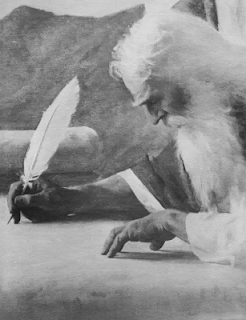2 Nephi 19:6–7 is one of the most well-known prophecies about the
Savior. Listen to the following youtube link while you read the rest of this blog entry.
“The government shall be upon his
shoulder”
Elder Jeffrey R.
Holland of the Quorum of the Twelve Apostles wrote that though we often
associate Isaiah’s prophecy in 2 Nephi
19:6–7 with the birth of Christ, it will also be fulfilled at the time of
the Millennium:
“The fact that the
government would eventually be upon his shoulders affirms what all the world
will one day acknowledge—that he is Lord of lords and King of kings and will
one day rule over the earth and his Church in person” (Christ and the New
Covenant: The Messianic Message of the Book of Mormon [1997], 80).
Elder Holland also explained the
significance of the various titles applied to the Lord Jesus Christ in these verses:
“As ‘Wonderful Counselor,’ he will
be our mediator, our intercessor, defending our cause in the courts of
heaven. …
“Of course, as noted by Isaiah,
Christ is not only a mediator but also a judge [see Mosiah 3:10;
Moroni
10:34; Moses
6:57]. It is in that role of judge that we may find even greater meaning in
Abinadi’s repeated expression that ‘God himself’ will come down to redeem his
people [Mosiah
13:28; see also Mosiah 13:34;
15:1; Alma 42:15].
It is as if the judge in that great courtroom in heaven, unwilling to ask
anyone but himself to bear the burdens of the guilty people standing in the
dock, takes off his judicial robes and comes down to earth to bear their
stripes personally. Christ as merciful judge is as beautiful and wonderful a
concept as that of Christ as counselor, mediator, and advocate.
“‘Mighty God’ conveys something of
the power of God, his strength, omnipotence, and unconquerable influence.
Isaiah sees him as always able to overcome the effects of sin and transgression
in his people and to triumph forever over the would-be oppressors of the
children of Israel.
“‘Everlasting Father’ underscores
the fundamental doctrine that Christ is a Father—Creator of worlds without
number, the Father of restored physical life through the Resurrection, the
Father of eternal life for his spiritually begotten sons and daughters, and the
One acting for the Father (Elohim) through divine investiture of authority. All
should seek to be born of him and become his sons and his daughters [see Mosiah 5:7].
“Lastly, with the phrase ‘Prince of
Peace,’ we rejoice that when the King shall come, there will be no more war in
the human heart or among the nations of the world. This is a peaceful king, the
king of Salem, the city that would later become Jeru-Salem. Christ will bring
peace to those who accept him in mortality in whatever era they live, and he
will bring peace to all those in his millennial and postmillennial realms of
glory” (Christ and the New Covenant,
80–82).
SISTER COLVIN WILL ASK YOU A QUESTION ABOUT THIS BLOG ENTRY FOR POINTS.






